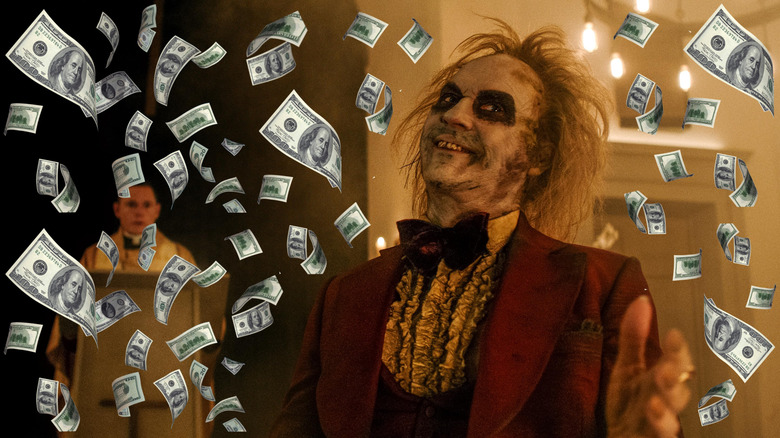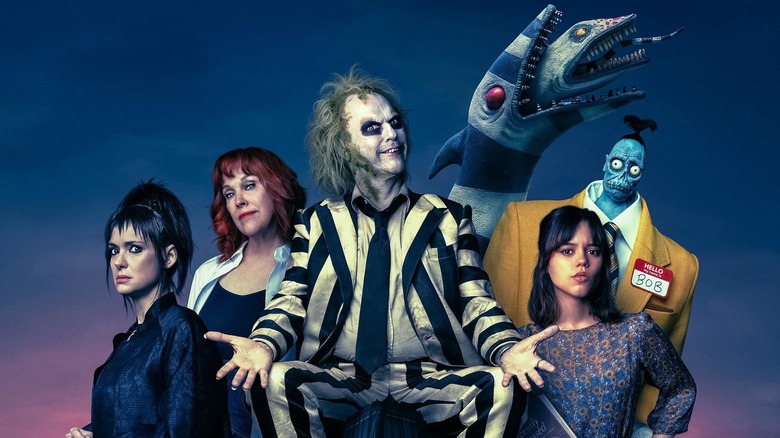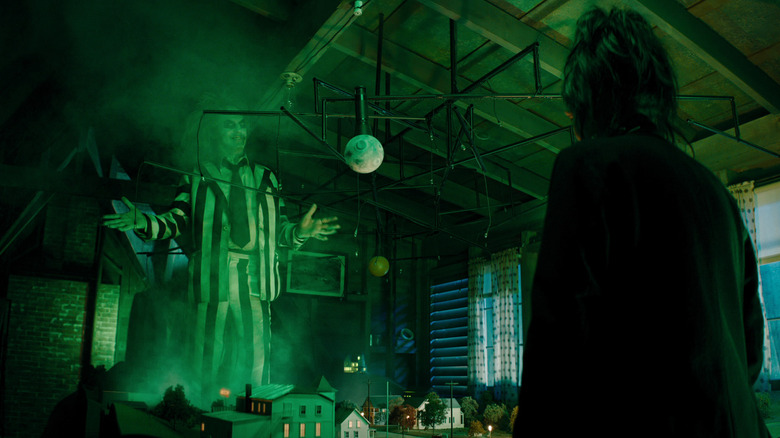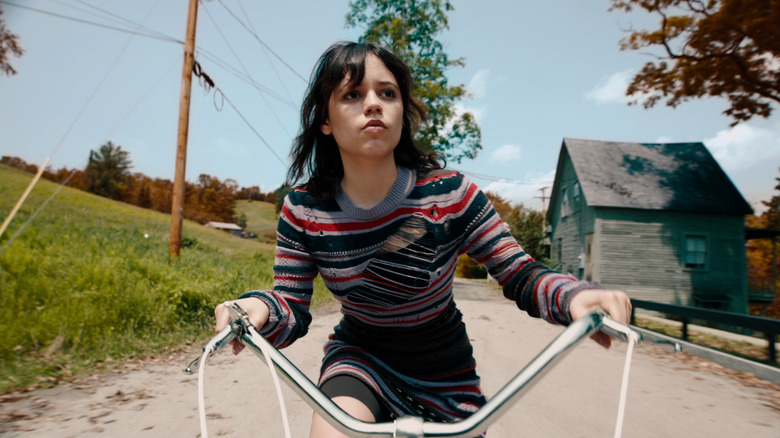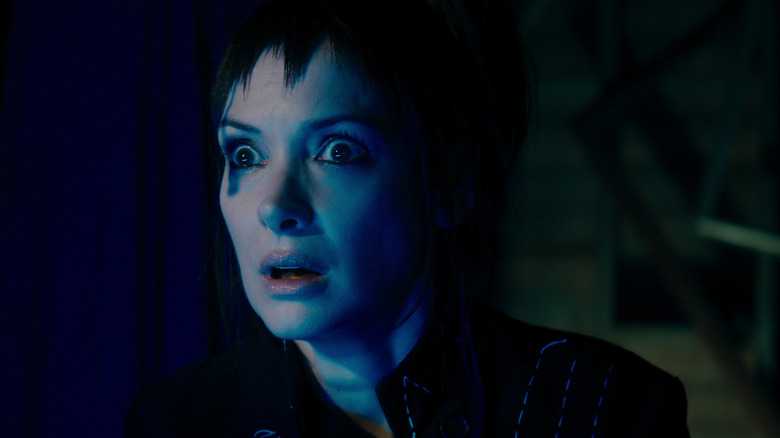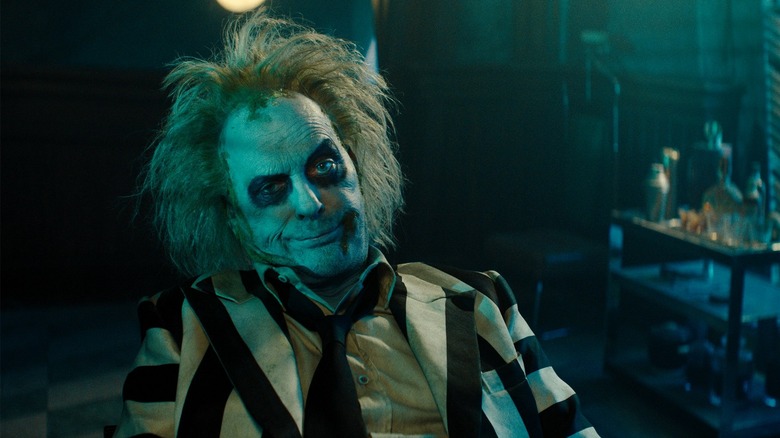5 Reasons Why Beetlejuice Beetlejuice Killed It At The Box Office
After a quiet couple of weeks at the box office, Tim Burton brought it roaring back to life with a sequel more than three decades in the making. "Beetlejuice Beetlejuice" hit theaters this past weekend and, in doing so, provided 2024 with one of its biggest opening frames of the year as audiences flocked to see Michael Keaton's Beetlejuice and Winona Ryder's Lydia Deetz reunited all these years later for another round of supernatural hijinks.
"Beetlejuice Beetlejuice" earned an estimated $110 million domestically over the weekend, easily giving it the number one spot on the charts. The sequel also pulled in $35.4 million overseas, giving it a $145.4 million global start. For context, the original "Beetlejuice" made just shy of $75 million during its entire run at the box office. The sequel has already made nearly double that in a single weekend. Plus, Burton's follow-up still has several territories to open in overseas, meaning the party is very much just getting started.
So, what went right here? How did Burton manage to revisit this world so successfully 36 years later? Why was now the proper time for the long-discussed sequel? We're going to look at the biggest reasons why "Beetlejuice Beetlejuice" managed to become one of the biggest box office success stories of 2024, and one of the biggest hits Burton has had in a long, long time. Let's get into it.
Beetlejuice Beetlejuice successfully executed the legacy sequel formula
For the last decade or so, Hollywood has made a lot of what we would call legacy sequels. The best example might be "Star Wars: Episode VII — The Force Awakens," a $2 billion global box office smash hit that reunited members of the original trilogy with a brand new cast to tell a fresh story that appealed to both younger and older moviegoers. Some of the most successful movies in history have employed similar strategies, such as 2015's "Jurassic World" ($1.67 billion worldwide), 2022's "Top Gun: Maverick" ($1.49 billion worldwide), and, to some degree, 2021's "Spider-Man: No Way Home" ($1.9 billion worldwide).
In waiting so long to make "Beetlejuice 2," Burton and Warner Bros., almost by accident, managed to make use of the legacy sequel formula to squeeze the most juice out of this one. Granted, the movie as it exists is no accident. From using old-school practical effects to putting together a pitch-perfect ensemble, "Beetlejuice Beetlejuice" is a true crowd-pleaser. Legacy sequels only work if the end result appeals to audiences, and it's crystal clear that this one did. But when they work, the sky is truly the limit. As a result, Burton and WB are benefiting greatly in the early going with this one.
Word of mouth for Beetlejuice Beetlejuice was good enough
Speaking of making a crowd-pleaser, one obvious thing that helped make this movie a success on opening weekend was relatively strong word of mouth. "Beetlejuice Beetlejuice" currently holds a respectable 76% approval rating from critics on Rotten Tomatoes to go with a solid 82% audience rating. It also earned a good-but-not-great B+ on CinemaScore. What's important here is that the reviews weren't bad, which didn't drive anyone who was on the fence away. Let's be clear, when a movie blows past projections and opens with $110 million, a certain number of audience members were in the bag no matter what. The reviews, in this case, probably helped when it came to more casual ticket buyers.
/Film's Jacob Hall gave "Beetlejuice Beetlejuice" a 7 out of 10 rating in his review saying that "Burton has recaptured the lightning that made him a household name in the first place." To that end, the marketing very much made this look like an old-school Tim Burton film, which is something that audiences were clearly eager to see. How much positive word of mouth will extends beyond opening weekend remains to be seen but, given the film's relatively reasonable $100 million budget, it's in outstanding shape, barring a catastrophic, unlikely steep drop off.
The Jenna Ortega Factor
There is no denying that bringing back Michael Keaton, Winona Ryder, and Catherine O'Hara was a factor in making this film a success. However, it's also undeniable that casting Jenna Ortega as Lydia's daughter Astrid was a slam dunk move that helped put this sequel on the radar of younger moviegoers. Thanks to the success of the recent "Scream" films, among other works, Ortega has become an A-list star. Heck, Burton has cited the Ortega-led Netflix series "Wednesday" as the reason "Beetlejuice Beetlejuice" finally happened in the first place. That speaks volume about Ortega's importance to the equation.
Sometimes, the perfect star arrives for the perfect role at the perfect time. Ryder even said in an interview with the Associated Press that the original "Beetlejuice" cast and crew were "waiting for Jenna to be born." Ortega has an undeniable level of star power and this is precisely the kind of movie that allowed her to shine. While affection for the original "Beetlejuice" helped bring back older moviegoers, Ortega's involvement helped with the other side of the coin.
Taking advantage of September
For whatever reason, studios have often ignored September as a month capable of delivering a big hit. For years, January and September were considered "dump months" where studios would drop less-than-great films, waiting for the greener pastures elsewhere on the calendar. Warner Bros., in particular, has wisely realized that September can be a haven for the right movie. "Beetlejuice Beetlejuice" was very much the right movie at the right time, in this case.
For one, the last consequential big release was "Alien: Romulus" four weeks ago (all due respect to "Blink Twice"). When Lionsgate's "The Crow" remake bombed at the box office, it left the calendar feeling especially empty for the last few weeks. So, audiences weren't exhausted with too many big movies to choose from in the marketplace. On the contrary, they were ready to embrace something worth getting up off of the couch for.
Historically speaking, "Beetlejuice Beetlejuice" now sits comfortably as the second-biggest September opening weekend of all time, nestled between 2017's "It" ($123 million) and 2019's "It Chapter Two" ($91 million). Both of those were also Warner Bros. movies, and both of them also opened in early September. It's no accident, and the studio has made great use of this spot on the calendar several times now.
The power of Tim Burton when he's firing on all cylinders
There is undoubtedly something to be said in the wake of the success of "Beetlejuice Beetlejuice" regarding the power of Tim Burton as a filmmaker. Not all that many directors can draw a ton of attention just because their name is on a project. Steven Spielberg, Quentin Tarantino, Christopher Nolan; there are only a handful. It doesn't always guarantee success, but it guarantees a certain level of attention. When it works, in Burton's case, the upside is ridiculously huge. What's more, this is the first time in a long time that Burton has been firing on all cylinders in a way that resonates with his loyal audience.
Burton's several previous directorial efforts, including the live-action "Dumbo" remake, "Miss Peregrine's Home for Peculiar Children," and "Big Eyes" simply failed to catch on with his fans in the way so many of his other movies had. Just look at 2010's "Alice in Wonderland," which made more than $1 billion worldwide, becoming just the sixth movie in history to do so at that time. That was a credit to the power of Burton when he's at the top of his game. With this long-awaited sequel, it seems fair to say the beloved director has returned to the top for the first time in a long time.
"Beetlejuice Beetlejuice" is in theaters now.
